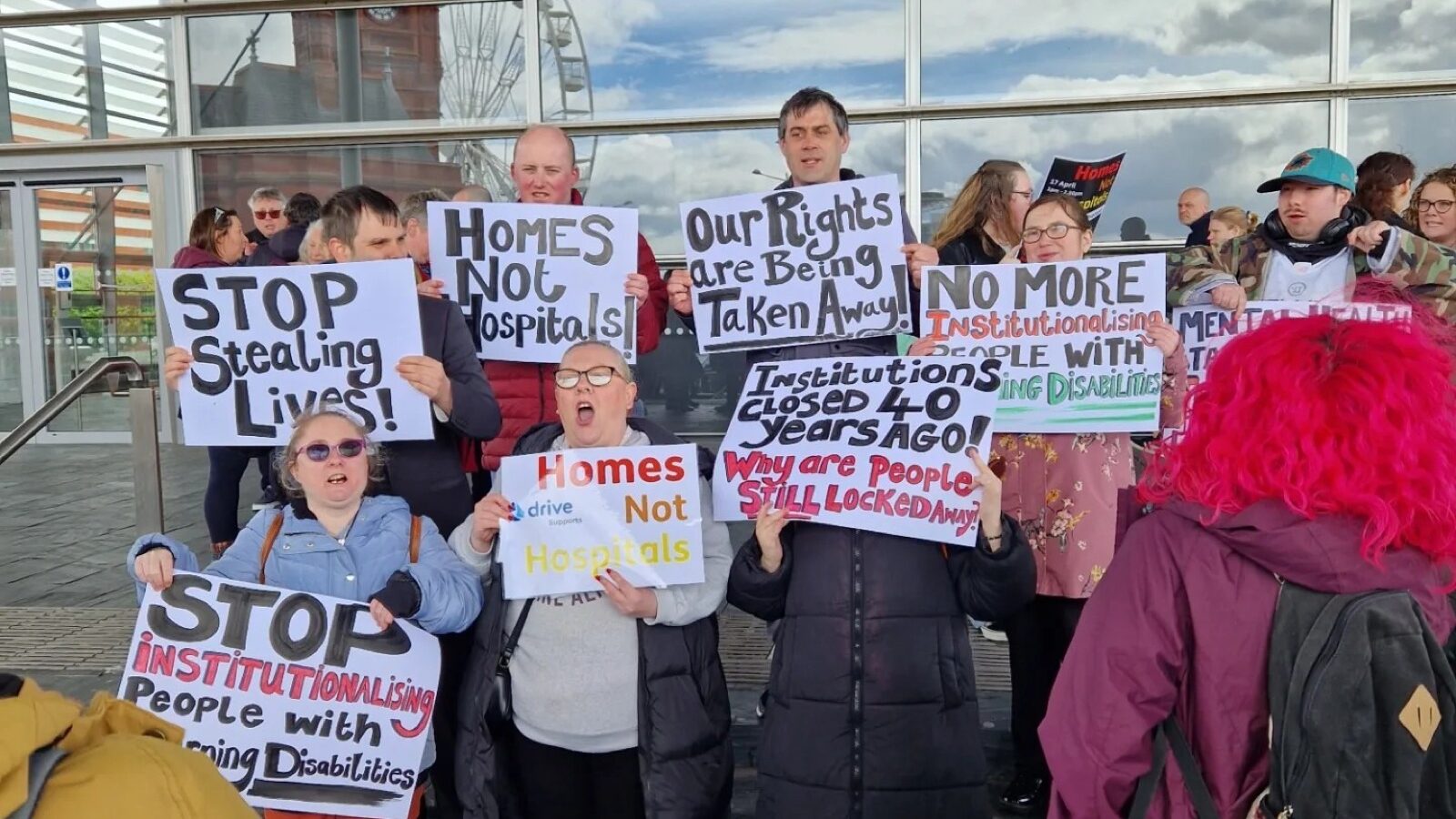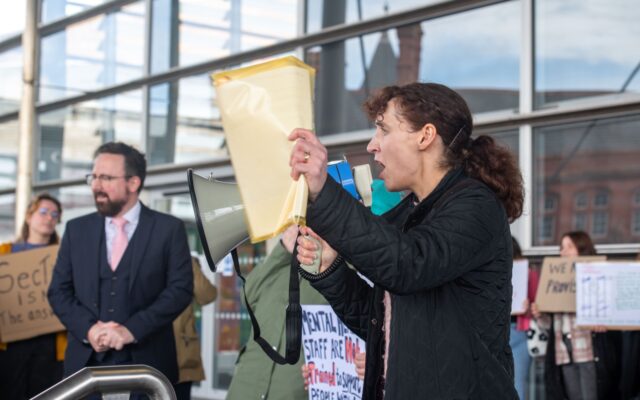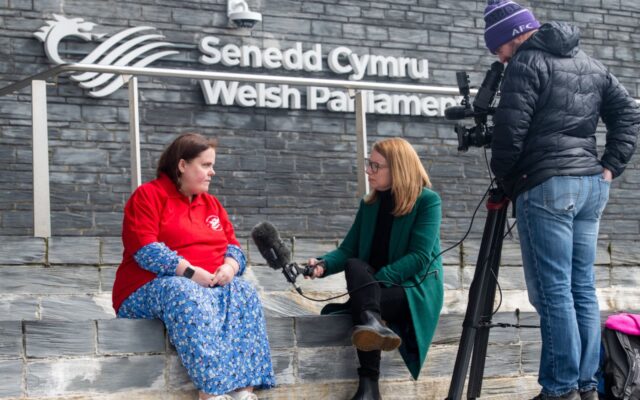I have a 21-year-old son, Jack, with a learning disability, autism, ADHD and epilepsy who is locked up in a hospital in Wales. And I know families from Wales who also have loved ones locked up in hospitals, writes Dawn Cavanagh.
There are too many institutionalised, congregate settings in Wales. There are also experiences of poor care. These can lead to behaviour that challenges and, under mental health law, people with a learning disability can be sectioned for that – not because they have a mental health condition.
The system is stacked up against them and I find this deeply unjust.
Stolen Lives, the campaign I set up last November, is important because when you have a loved one with a learning disability and/or autism who is locked up in a hospital, it can be really isolating and difficult to fight the system.
And we are talking about human rights abuses here. Many of our loved ones have been segregated, secluded, drugged and/or restrained.
Stolen Lives brings these families together, helping them to feel less alone and disempowered, giving them a unified voice with which to bring attention to this issue and fight for change.
I hope it acts as a much-needed wake-up call to decision makers, forcing them to listen and act.
I cannot recall a time when people with learning disabilities and/or autism, their families and organisations congregated outside the Senedd to protest about such an important human rights issue.
On the day, it was incredible. You couldn’t see the Senedd steps because of the sheer volume of people.
We had some great speakers, including Sioned Williams, MS for Plaid Cymru and chair of the cross-party group for learning disabilities. Game of Thrones actor Owen Teale joined and had his picture taken with protesters. We ran an online campaign during the day via campaign group Rightful Lives and self-advocacy organisation All Wales People First.
The most powerful moment was seeing so many people with learning disabilities – who face so many barriers to democratic participation – holding up banners and chanting outside the Senedd.
Another powerful moment was when an autistic man who happened to be passing joined us. He explained he had been a mental health inpatient and felt strongly the system had let him down.
It was also moving to see Jane Haines and her mother Judy at the protest. It was coming up to the second anniversary of the death of Jane’s daughter Ayla. Ayla, who had autism, died miles from her home in Wales in a mental health unit.
It has been over 40 years since the pioneering 1983 Wales strategy on learning disability aimed to get people out of long-stay hospitals and into their own homes. Yet today people are being locked up in hospitals because the support is not there in the community. While there is a strategic action plan for 2022–26, there is no sense of how things will be done, by whom or by when.
Wales once led the way – but now it has lost its way.
The Welsh government says that it set the policy and it is up to the health boards and the local authorities to deliver. The problem is that they don’t do this and the Welsh government don’t police this so there are no consequences for not implementing the policy.
We are not aware of a national plan for building the right support here in Wales. There is a lack of strategic thinking.
Stolen Lives hopes that the protest will show the Welsh Government the strength of feeling that is out there. For too long, it has failed to listen to what people with learning disabilities and/or autism, their families and organisations tell them. We are fed up with being told that the government does not get involved with individual cases.
We have launched our petition to stop people being locked up, which we really hope people will support, and we will continue with our campaign in the hope that the Welsh government will work with us to address this injustice.
Dr Dawn Cavanagh is an academic, activist and campaigner from Pembrokeshire, Wales
The issues we’re campaigning on are important to me, writes Sophie Hinksman.
At the protest, I gave a speech about my own lived experience. I’m an individual with a learning disability and I was placed in a mental health hospital a few years ago. I had two stays in the same year – 28 days each stay.
I know people who have had similar experiences to me. I also know Dawn and her son Jack. Their experiences are so upsetting.
We don’t want people stuck in mental health hospitals. They need to be living in their own homes. Those hospitals are not nice places to be stuck in. It’s so important that learning disability and mental health are kept separately.
It’s so important to have the right support. Forty years ago, Wales was ahead of everyone its strategy that aimed to get people out of institutions and into the community. Now I feel we’re going backwards.
I wanted to get involved in this because this is happening to real people. Real people like me, like Jack and many others. We must get people to listen and we must stop moving backwards.
It’s important that change happens. People must not be put in these hospitals when it’s the wrong support for them. I hope that co-production will become a reality so that we can get things going forward not backwards.
This protest was much bigger than ones I did before. It was my first stand-up event – the others were marches. This was the only one I have been to with the media present.
It was very different, because I didn’t know who was going to be there. I wasn’t expecting to be in the media either until very close to the event.
It was a very good day with a great turnout. Lots of people there from the media. I was happy with my speech and the media – the BBC. It was a shame the weather wasn’t better.
The most memorable moment was people with learning disabilities and parents and carers coming together and chanting for joint change. The camaraderie and mutual support for a cause we were all so passionate about.
Why do I think people with learning disabilities are still being placed into secure mental health units? Not everyone has a powerful voice. Not everyone has the confidence to speak up. I have the confidence to speak up, but I couldn’t when I wasn’t well.
When people are vulnerable, there is a danger that professionals can barge in and take over.
It’s so important to keep co-production at the forefront of what we do when it comes to support for people with learning disabilities.
Consult with the person, with their family and their support people. We must be given the right support for all that to happen.
Now the protest has taken place, hopefully decision makers will listen to us and we can move forward with change for the better.
It’s important now that we have started the protest that we don’t let this slide. We need to keep going.
Sophie Hinksman is a campaigner from West Wales







